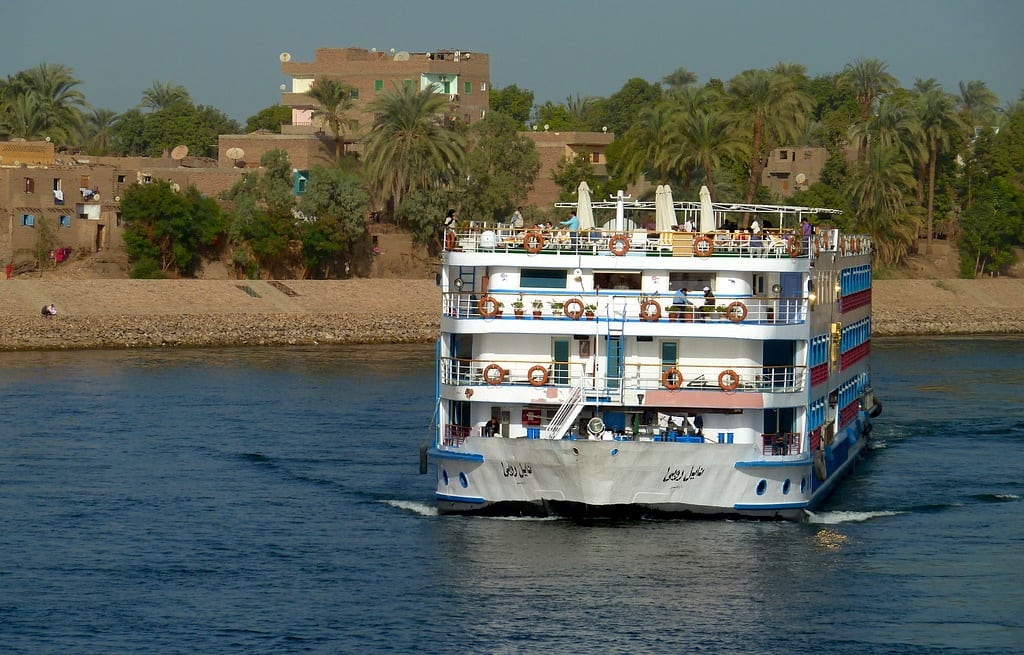Skift Take
Yes, there may be safety along the Nile. But people have become accustomed to feeling absolutely pampered along the way. And they have no interest in changing -- no matter the political climate.
The Old Cataract hotel in Aswan that was used as a location for the film of Agatha Christie’s Death on the Nile, and which underwent a multi-million pound refurbishment in 2011, stands almost empty.
This year, the biggest casualty on the Nile is tourism.
Easter is one of Egypt’s peak tourism weeks, along with Christmas and October half term. During an Easter visit a few years before the 2011 Arab Spring and the election of a Muslim Brotherhood president, there were so many visitors in Luxor that we stood almost shoulder-to-shoulder in the Valley of the Kings and had to wait 20 minutes to enter some of the tombs. This Easter, there was more than enough room in the valley to feel lonely, and no queues at the tombs. No problem getting a hotel room, either.
Tourism has been on the slide since demonstrators took to Tahrir Square at the beginning of 2011. Each calamitous event since then has made a bad situation worse, from tear-gas and pitch battles in downtown Cairo to kidnapping in Sinai. February’s fatal hot-air balloon crash in Luxor dealt another body blow to the country’s flailing tourism industry. There are car crashes, muggings, lawlessness and yes, balloon crashes elsewhere in the world, but each new story from Egypt – of torture or legal standoff, or of Islamist extremists wanting to dismantle the pyramids, cover the statues and ban alcohol – now feeds into a narrative of national collapse.
The reality is more complex. Most people in Cairo and in the rest of Egypt go about their business, if they still have one, many of them wondering whether freedom of speech and the right to vote are worth the price they are being forced to pay. People who depend on tourism are among those hit hardest.
Hisham Zaazou, Egypt’s Minister of Tourism said the situation is more complex than it might appear. “There have been winners and losers.”
The winners have mostly been on the beach.
Some years ago Egypt’s prime coastal region was rebranded the Red Sea Riviera. Keeping the word ‘Egypt’ off advertising material seems to have paid off because in spite of kidnappings (some just a couple of hours from the resorts, though rarely lasting more than a few hours) Easter occupancy rates were still over 50 per cent. Hurghada and the mainland coastal resorts (El Gouna and Sahl Hasheesh) were even higher.
The losers were on the Nile. You might expect tourists to avoid Cairo, where most of the violence has occurred. But there has been no major political conflict in Luxor and yet Nile cruise ships are moored in blocks of six or eight in front of Luxor temple and the grand old Winter Palace Hotel. Hotel occupancy in Luxor was down to 17 per cent during the Easter holiday “high season”. In Aswan, the other end of the traditional cruise route, where there has been no headline-grabbing disaster, it was even lower. Now that the school holidays are over and temperatures are rising, those figures are dropping further.
During five days on the Nile last week I didn’t see a cruise boat pass with more than a dozen people on deck (and most have room for several hundred). On five mornings in two Luxor hotels I never saw more than a handful of people at breakfast. This seems to have less of an effect on the national budget than one might expect. Tourism brought in US$12.5bn in the peak year of 2010 and $10bn in 2012. But the downturn is catastrophic on a local level. Taxi and caliche (horse and cart) drivers sit idle, traders are desperate, and hotel projects – of which Luxor had many before the revolution – sit idle. Four Seasons dropped plans for a Luxor hotel and Rocco Forte’s refurbishment of the city’s oldest hotel seems to have come to a standstill. When a Luxor trader told me that by buying something I would
be saving his life, for once he wasn’t entirely exaggerating: most in Luxor and Aswan depend on tourism.
“We understand that people are nervous about coming to Egypt,” my Luxor guide said, “but have you had or seen or heard any trouble while you have been here?” I had not. What I experienced were unique, world-class monuments, welcoming people and great hotels, all empty. I was alone in Luxor Temple one hot afternoon until a London-based woman walked in. “This is terrible for Egypt, but great for us,” she commented. And walking away, she stopped and pointed to the cloudless blue sky. “Oh, and it’s snowing again in England.”
![]()
Have a confidential tip for Skift? Get in touch
Tags: egypt, river cruise
Photo credit: A cruise ship plying the Nile's waters. Jason Pearce / Flickr
